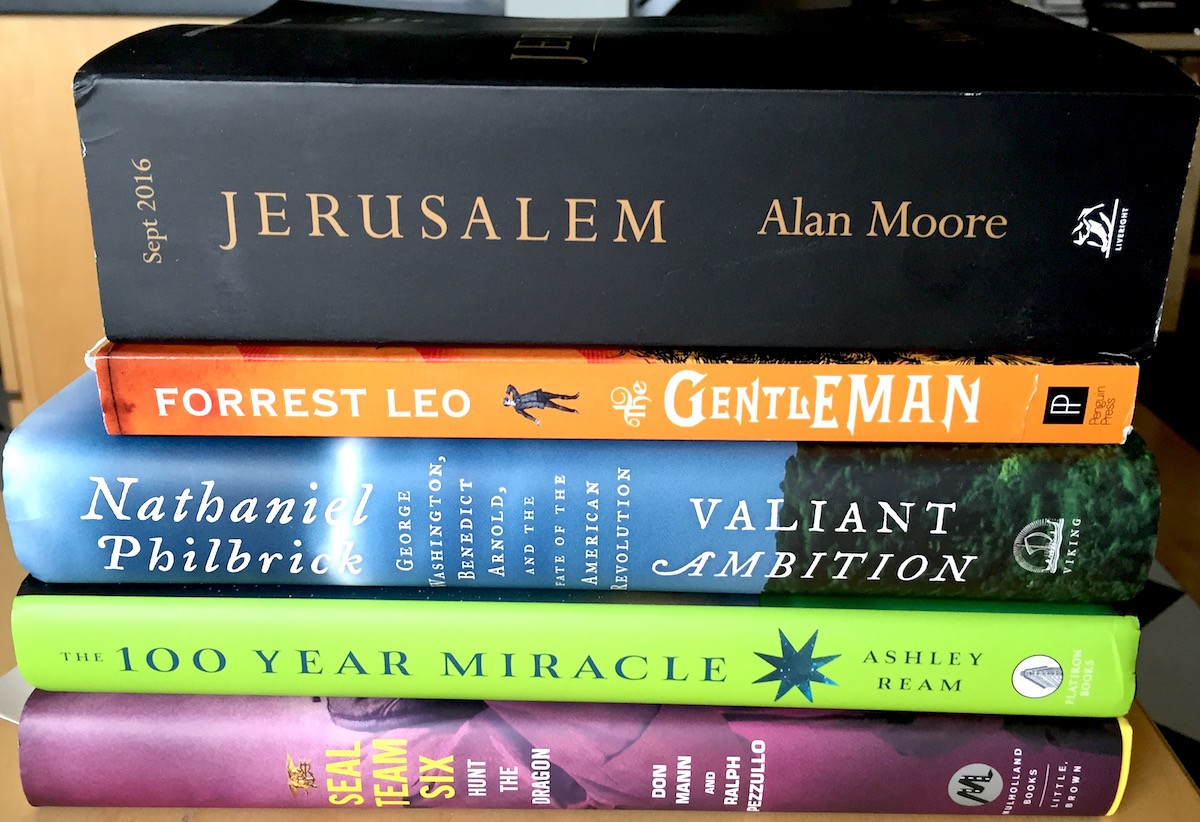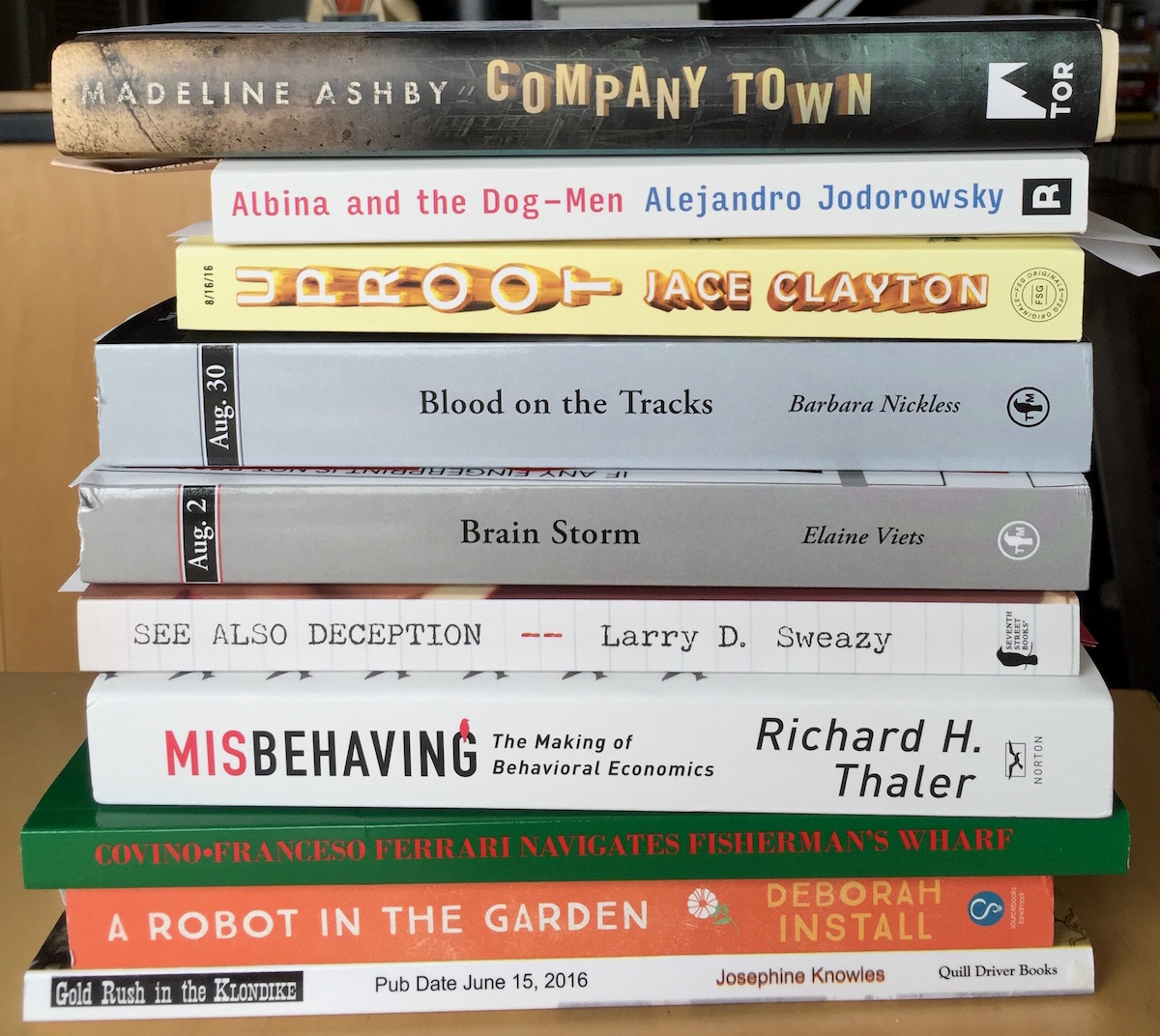Portrait Gallery: Nellie Bly
Each week, Christine Marie Larsen creates a portrait of a new author for us. Have any favorites you’d love to see immortalized? Let us know
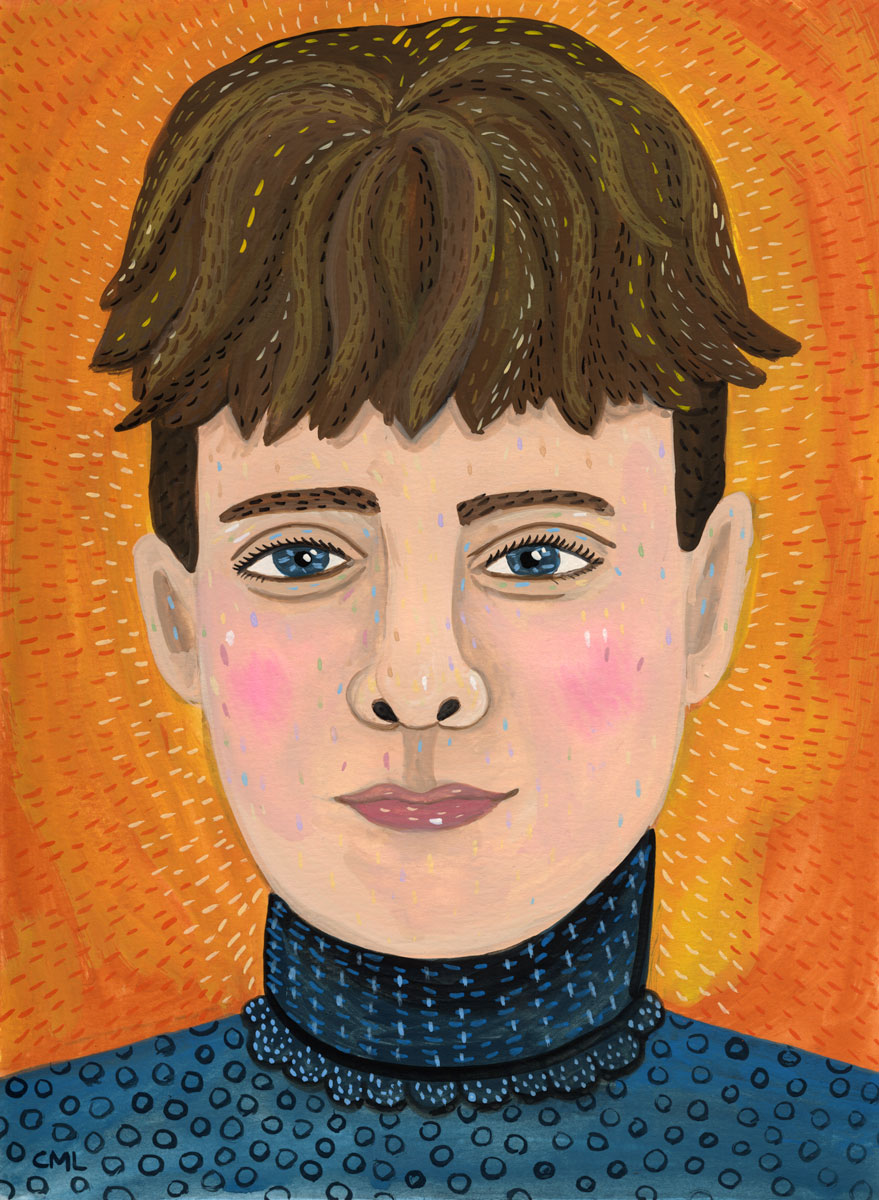
Today is the 152nd birthday of Nellie Bly, whose real name was Elizabeth Cochran Seaman. Bly was a journalist in the early 20th century, best known for an undercover investigation into the horrid conditions of mental hospitals, and for an around-the-world trip, to realize the fictional travels of Jules Verne's Around the World in Eighty Days (she did it in seventy-two). In 1922 she died, at fifty-seven, from pneumonia.
The Antioch Review published a horrifying transphobic essay in its Winter 2016 issue. They issued a very bad apology today. You should read this open letter of protest to Antioch, and sign it if you agree.
Book News Roundup: A new reading series, a contest for young writers, and the end of Bookslut
Save the date: the Seward Park branch of Third Place Books will be having its grand opening party on May 21st and May 22nd. This is super-exciting! It's not every day (or even every year) you get to celebrate the grand opening of a new Seattle bookstore. You can (and should) confirm that you'll be there on the Facebook invite for the weekend.
Save the date, part 2: on June 2nd, you'll get a sneak preview of a new reading series hosted and curated by Mattilda Bernstein Sycamore. Contagious Exchanges: Queer Writers in Conversation is self-described as "a monthly series featuring two dynamic writers bridging genre, style, sensibility, and all the markers of identity in queer lives." The official launch will be in October, but the June outing at the Hugo House will be a sort of "pilot episode" for the series, featuring poets Tara Hardy and Anastacia Tolbert.
Seattle poet and novelist Karen Finneyfrock just launched something called the "Seattle Youth Novelist Project," in which a Seattle writer aged 13-19 will earn a mentorship from Finneyfrock and a spot in a reading this October. If you know any young writers, you should let them know about this. Deadline for submissions is May 30th.
Where to begin with this stupid New York Times story on men's book clubs? Look, I just don't think this kind of thing should be celebrated: "'We do not read so-called chick lit,' he said. 'The main character cannot be a woman.'" There is nothing newsworthy in men who read only books by men. That's still the status fucking quo. A bunch of men who choose to ignore the experiences and perspectives of 50 percent of the population is, unfortunately, absolutely normal. When you run a media outlet, one of the most important decisions you make is to whom you pass the microphone. These men's book clubs did not deserve the microphone because there is nothing interesting about them. The only good thing to come from this story is the Twitter hashtag #ManlyBookClubNames:
Atlas Fistbumped #ManlyBookClubNames
— ppyajunebug (@ppyajunebug) May 4, 2016
Harry Potter and the Fragile Male Ego #ManlyBookClubNames
— Anne Ursu (@anneursu) May 4, 2016
A Confederacy of Dunces #ManlyBookClubNames
— Rob Spillman (@robspillman) May 5, 2016
A lot of writers are getting upset about this (very good) interview with Bookslut founder Jessa Crispin. Many Facebook posts have been written refuting Crispin's claim that everyone in modern American literature is "super-cheerful because they’re trying to sell you something, and I find it really repulsive. There seems to be less and less underground. And what it’s replaced by is this very professional, shiny, happy plastic version of literature." Frankly, it seems weird to get upset over Crispin's opinion. If your view of American literature differs from hers, that's great. Go revel in the book world you see, and share its joys with others! But if your vision of American literature is somehow threatened by Crispin's negative opinion, to the point where you have to write an angry screed about it, maybe she's got a point?
Speaking of Bookslut, the final issue of the online book review site features a good interview with Seattle writer Eli Sanders about his book While the City Slept. (We interviewed Sanders about his book a while back.)
Every month, the University of Chicago gives away a free e-book. This month's free e-book is a very short collection titled Ebert's Bests, featuring an autobiographical essay by the late, great Roger Ebert about how he came to be a film critic. Go download the book now.
One day, publishers will finally figure out a way to bundle an e-book edition with the purchase of a physical book. (It's really not that hard; comics publishers do this all the time.) Until that glorious day, Harvard Book Store is teaming with an app called Shelfie to offer e-books for sale with certain physical books at a low cost. It's not good enough, but it is at least a single step in the right direction.
Thursday Comics Hangover: Everything you need to know about Free Comic Book Day
This Saturday is Free Comic Book Day, the day when, duh, participating comics shops give away free comics to anyone who walks in. You can find the comic shop closest to you here. Some things to know:
If you’re looking for a good book, try the FCBD edition of the first issue of Archie, by Mark Waid and Fiona Staples. I reviewed it when it came out back in July of last year. It’s a surprisingly great high school drama with interesting characters and it drops you in the middle of a compelling story.
Other must-grabs include Mooncop, a sampler of comics by the very funny cartoonist Tom Gauld; Help the CBLDF…Defend Comics, a promotional book from the free speech advocates at the Comic Book Legal Defense Fund including comics by Craig Thompson and Lucy Knisley; the Love and Rockets Sampler Edition from Fantagraphics — if you haven’t read Love and Rockets, this is the one you have to take home — and March, a comic book history of the civil rights movement by Congressman John Lewis.
Some other intriguing titles include Z2 Comics Lab, We Can Never Go Home/Young Terrorists, and Camp Midnight, an all-ages story about a girl who accidentally gets sent to a summer camp for monsters. Really, if something looks interesting to you, you should grab it. After all, it’s free.
Also, as I mentioned on this site earlier this week, you should absolutely be reading Ms. Marvel, which is written by local author G. Willow Wilson. Wilson will be signing books at Phoenix Comics on Broadway from 12 to 3 pm on Free Comic Book Day, and she’ll be joined by Brooke Allen of the very fun comic Lumberjanes and Zach Davisson, a translator of Japanese comics.
If you’re looking to visit Arcane Comics this FCBD, you should be advised that earlier this week, the shop moved from Ballard to 152nd and Aurora up in Shoreline. Their new address is 15202 Aurora Ave N, Shoreline, WA, 98133. Arcane has always been one of the friendliest, best-stocked comics shops in town, and so you should definitely drop by and show your support.
If you regularly buy comics, you can absolutely take part in FCBD. But you should also remember that Free Comic Book Day isn’t free for shop owners; they have to buy the comics you’re taking. So if you're already a comics supporter, it’s polite to buy something — the first issue of a graphic novel series you’ve been interested in trying, say. Think of it as a subsidy: your purchase is helping to pay for the comic books that are bringing in the new readers who will help keep your comics shop thriving for years to come. Most local shops make FCBD easy on your wallet. Comics Dungeon in Wallingford is having a fairly expansive sale, for instance, and so is Dreamstrands Comics in Greenwood. Phoenix Comics is letting customers roll the dice to determine their discounts. And Fantagraphics Bookstore and Gallery in Georgetown is serving wedding cake.
Visit more than one shop. Seattle has a vibrant comics community in large part because it’s packed full of well-stocked comics shops staffed by friendly salespeople. FCBD is a time to celebrate this wonderful resource. Have fun. Be an unapologetic nerd. Go find a new comic to love.
Finding the people in the Winter Fortress
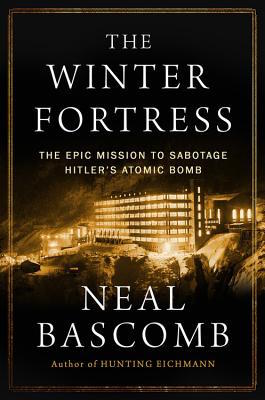
Last week, we interviewed new-to-Seattle author Neal Bascomb for our New Hire column. Yesterday, Bascomb’s newest book, a non-fiction Norwegian World War II espionage thriller called The Winter Fortress, was officially published. Bascomb is hosting a launch party at Hugo House tomorrow night. We talked about the pleasures and pains of research and why his book might appeal to fans of the movie Red Dawn.
Did moving to Seattle make the research part of your job more difficult?
It's so much easier to do research now than it was 20 years ago. I'm doing this book — my next book — on a World War I escape story. I felt like when I was first starting out writing, I had to be at the New York Public Library, or at Columbia, to do the research, to find archives. Now there's so much available online. Eventually, I have to have someone go to the archives, but I can find out where everything is from my office at home, which is dramatically different than it was 20 years ago.
You did eventually travel for Winter Fortress, right? You were in Norway to research this book?
Yeah. My wife says that I choose what books to write based on where I get to travel, which could be partly true. I picked some good ones: Argentina, and Israel, and Australia. Once I find everything that's available online, then I'm archiving, interviewing, or hunting down people for diaries, or letters. There is a fair bit of travel. Which I love.
What are you doing to celebrate the book launch locally?
I’ve got a reading at Hugo House on May 5th, and then one at the Nordic Heritage Museum on the 24th of May. I picked the right book to move to Seattle around, considering it's a Norwegian-centered story, and there's a very vibrant Norwegian community here.
This is probably an obvious question, but just to make sure, you were done with the book by the time you moved here in the summer of last year?
I finished it here. I edited it here. I actually did all the hard work on it here. The writing is easy, the revising is where the challenge comes in.
That seems like a very short schedule, compared to some of the writers — especially of historical stuff — I've talked to...
No, that's right. Wait. Can that be right?
If you're on a once-every-two-years schedule, I guess that's right.
Yes, for sure. It does seem short, but I was a little late because of the move, which made me a little behind. I had all my research in my boxes, and I was doing revisions, and I was like, "Shit, I can't find anything." Yes.
A cross-country move seems like it would be tough when you’re working on a research-heavy book.
The moving van had most of my research, and then I brought my own boxes, that critical research, with me because I didn't want to lose it.
So can you give the elevator pitch to my readers for the book?
Well, it's the story of the sabotage of the German atomic bomb program. It's the story of the sabotage of Vemork Heavy Water Factory, which was key to their atomic research. Really, it's the story of Leif Tronstad, who was the 38-year-old scientist who built the plant, and then escaped Norway to work for the Allies. It's the story of Leif, and then this group of young Norwegians who were mostly in their early twenties, who escaped Norway, to be trained in England, to come back and fight. A lot of them were local boys to the area.
As I often say — I say it a little flippantly — but this story, Winter Fortress, is like their Red Dawn moment. You know, the eighties movie, with Patrick Swayze? The Germans come in. The local boys go to the mountains, and they use their local skills to fight back. It does have that flavor to it.
I tried as much as possible for it to be a story that told through their eyes. There's been other histories of the sabotage of Vemork, but most of them are heavy on just the events: “they came in, they went in, they blew up the plant.” None of them really had access to the archives, or the diaries, to the level of this book. I'm hoping it's very much a story of people instead of events.
Why is that? Why has nobody done the personal side yet?
There was a book by an American journalist about 20 years ago which was not based on, really, any of the Norwegian archives, or any of the other stuff, I think largely because it's in Norwegian. A lot of it wasn't accessible. Most of [the Norwegians in the story] really didn't want to talk about it that much, but they left so much stuff. I've never had more research — primary, firsthand research — on any other book than this one. I had daily diaries. I had memoirs. I had all the secret reports. I almost had too much, from most of the key players; hundreds of thousands of interview words. It was just incredible. Now that I'm back to really having to hunt and peck for every bit on this new book, it's like I look back at what I had with Winter Fortress, and I'm like, "I hate everything." It was a dream.
Is that also just because of the time difference between World War I and World War II?
Yeah. World War I is really hard. I think a lot of [World War I artifacts were] destroyed in World War II. But in Norway, this is one of their seminal stories. It's sort of like the Boston Tea Party, but for Norway. These guys recorded their experiences. In fact, Leif Tronstad, when four of these guys went off on their mission, he said, "In a hundred years, they will be writing about this." I think some of that took seed, in terms of their willingness to believe the history of what happened. Most of the primary research, and this was all Norwegian. Probably 80% of it was primary. At the least.
I was in Norway last year, and I did get the sense when I went into museums I got the sense that they were trying very hard to impress upon visitors that there was a healthy resistance movement during World War II. It seems as though the country is still very concerned with how they tell their own story. Did you have a hard time parsing what happened from the story that the Norwegians told themselves? Did you have a hard time as an outsider separating the truth from the legends?
I definitely felt like in Norway, the presence of World War II is still pretty strong. I mean, I felt that way in Europe, too, but in Norway, they really were under German thumb for almost 5 years, pretty brutally.
Norway was occupied in 1940, right? Germans essentially ran the country. And for 60 years, or 50 years, they've done one of two things: they've either built up this heroic resistance, which was robust. There was a robust resistance, with a lot of sacrifice, and a lot of courageous acts. But there was also a lot of collaboration. There were also a lot of people who just lived their lives. I think for 50 years, they largely centered, focused on, the courage. Which is natural. I think in the last 10 years or so, they really historically made efforts to examine this collaboration.
I felt like when I was there, there was a sort of a resistance to [examining the collaboration], again. Like, "Okay, we've seen that. Now let's go back to the history of the resistance." I felt like in my research I saw all three sides of it. There were collaborationists, and there was some pretty brutal stuff. That sort of murky history is there. It's there in Winter Fortress, for sure.
Your Week in Readings: The best literary events from May 4 - May 10
Wednesday May 4: Writing for a Cause
How do you write about politics and race and gender without being preachy? How do you bring passion to contemporary issues without overwhelming your reader? Former Seattle City Councilmember Nick Licata headlines a bill of writers not afraid to tell issues-based stories, including memoirist Elissa Washuta and poet Anastacia Tolbert. Hugo House, 1634 11th Ave, 322-7030, http://hugohouse.org. . Free. All ages. 7:30 p.m.Thursday May 5: Neal Bascomb
Neal Bascomb’s new book The Hidden Fortress is a non-fiction historical thriller about the plot to sabotage the Nazi quest for the atomic bomb. Bascomb moved to Seattle late last year and is still getting to know the city; let’s be neighborly by supporting his excellent new book. Hugo House, 1634 11th Ave, 322-7030, http://hugohouse.org. . Free. All ages. 7:30 p.m.Friday May 6: Jack Straw Writers Series
The first three Fridays of May, Jack Straw Productions presents local authors who have taken part in their annual Writers Program, which trains writers how to be better communicators. Tonight’s readers include Robert Lashley and Shin Yu Pai, who are two of the most talented poets the Seattle area has to offer. Jack Straw Cultural Center, 4261 Roosevelt Way NE, 634-0919. http://www.jackstraw.org/.$5. All ages. 7 p.m.Saturday May 7: Epilogue/Prologue
See our Event of the Week column for more details. Hugo House, 1634 11th Ave, 322-7030, http://hugohouse.org. Free. All ages. 7 p.m.Sunday May 8: Mother's Day Crafting Party
Look, it’s okay that you didn’t get your mom something for Mother’s Day. But the least you can do is take her to this crafting party with Sewing Happiness author Sanae Ishida. You’ll make new memories with the woman who gave you life, and Ishida might read from her kids’ book about a ninja. It’s a win-win. Queen Anne Book Company, 1811 Queen Anne Ave N., 284-2427, http://qabookco.com. Free. All ages. 3 p.m.Monday May 9: Todd Lockwood
Nobody paints a goddamned dragon like Todd Lockwood. The badass fantasy cover artist, who, I would like to reiterate, paints dragons for a living, now makes the leap from painting covers of fantasy novels to the writers’ chair. His debut novel, The Summer Dragon, promises “an exciting new take on the dragon-riding genre.” Sold! University Book Store, 4326 University Way N.E., 634-3400, http://www2.bookstore.washington.edu/. Free. All ages. 7 p.m.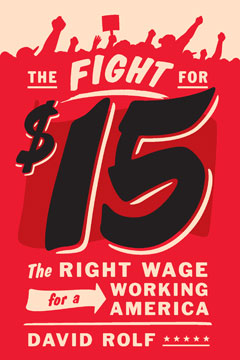
Tuesday May 10: David Rolf
Not so long ago, conservatives mocked Seattle’s push for a $15 minimum wage. Now, California and New York are scrambling to follow our lead. Local SEIU president David Rolf presents The Fight for Fifteen, his account of how Seattle adopted $15, and his explanation why the rest of the country needs to catch the hell up. Town Hall Seattle, 1119 8th Ave., 652-4255, http://townhallseattle.org. $5. All ages. 7 p.m.Event of the Week: Epilogue/Prologue at Hugo House

Seattle is right now trapped in the nether realm between openly mourning the past (see editor Jaimee Garbacik’s Ghosts of Seattle Past project) and openly agitating for the future (see the conversation about how quickly we can get light rail up and running to Ballard.) Tonight, the Hugo House finds itself exactly in between those two polar Seattle extremes, as a kind of Schrödinger’s nonprofit writing center. In twelve days, the House moves to its temporary headquarters on First Hill as a two-year guest of the Frye Art Museum while the old structure is demolished to make way for a shiny new facility at the base of five stories’ worth of condos.
For one last glorious Saturday night, the House is hosting a party called Epilogue/Prologue, a free celebration of the center’s past and its future. It should be a breathtakingly sloppy evening; partiers will be encouraged to write messages on the walls of the House. Will they reminisce over some of the best readings the House has hosted, like the time both Sam Lipsyte and Ben Lerner read in a single enchanted evening, or when Maria Semple unveiled pieces of what would become Where’d You Go, Bernadette?, or when Stacey Levine read a creepy story about the ghosts of mothers haunting houses that glowed with "the sweetness of cabinetry, or maple syrup?" Will they finally write down the gossip that has previously only been whispered about certain disgraced former Hugo House staffers? Will they admit to nasty trysts in the ever-filthy Hugo House bathrooms? One would certainly hope so. The best graffiti will be preserved and displayed in the new Hugo House two years from now, so there’s a real opportunity for immortality here.
Epilogue/Prologue also features booze, a “past room” full of photos from the House’s (nearly) two decades of continuous operation, food trucks, a confession booth, and a poetical-scientific experiment from lyrical behaviorists the Vis-à-Vis Society. But sometimes the best party features are the unplanned ones: get enough writers and enough beer into a single structure, and there’s likely to be fireworks, or fucking, or tears, or all three. And if you ply House staffers with a few drinks, you might be able to convince them to sneak you down into the basement to investigate the (supposedly empty) child’s coffin hiding in a musty passageway. (The building used to be a funeral home.)
But before you start singing “Danny Boy” and whining about how new buildings are all “boxy” and “have no soul,” it’s important to remember a few things: first of all, the House might be temporarily moving to First Hill, but it’s not really going anywhere. Second of all, it’s not every day that a nonprofit writing center gets an opportunity to reimagine itself, so it’s obviously more constructive to try to shape the House that comes than fret about the House that was. (I’m still pulling for them to open a bar in the new space that’s open seven days a week and becomes its own kind of literary center.) And third of all, remember that nobody likes a writer who can only look backward. All good writing faces forward, and the only future that really matters is the one you write for yourself. Hugo House, 1634 11th Ave, 322-7030, hugohouse.org. Free. All ages. 7 p.m.
It's time to GiveBIG, take two
Okay, so yesterday the GiveBIG website collapsed and died a very public death. Dozens, or hundreds, or thousands of Seattleites who wanted to donate money to their favorite Seattle-area nonprofits were unable to, and those nonprofits were forced to choose between either waiting out the computer problems or sending people to their own sites to donate. (The problem with the latter choice: donations directly to nonprofits wouldn't have access to the large amount of matching funds that are applied to donations through the GiveBIG site.) As we reported, the Seattle Foundation announced that GiveBIG would continue through midnight tonight.
So. There will be plenty of time in the weeks ahead for nonprofits to demand answers from Kimbia, the payment processing firm that seems to have shat the bed yesterday. Hopefully, Kimbia won't be around when GiveBIG arrives next year (especially since it seems they were charging exorbitant processing fees from the nonprofits to begin with.) But today is not the time to explore what went wrong, or to fix the problem for next year. Today is the time to GiveBIG.
Yesterday, Martin offered his three picks for literary-centric GiveBIG charities. And then I offered mine. I suggest you look through those posts, click through to GiveBIG, and donate what you can to these organizations. Yesterday's fiasco was not at all their fault, and in fact they lost a lot of money because of it. Now more than ever, they could use your support.
A quick note on problems with GiveBIG
We're always excited to promote GiveBIG every year, but this year it seems that the website is having serious issues. As in, it's impossible to donate through the GiveBIG site right now. Many nonprofits are reporting not receiving donations in over an hour, and the Seattle Foundation's calls for people to "refresh" the site don't seem to be working.
In short: GiveBIG this year is pretty much a clusterfuck. There will for sure be hell to pay in the coming days — this is a big day for Seattle's nonprofit community and this will surely affect the annual income of local organizations across the board. But what should you do if you want to donate but can't?
Well, first of all, keep trying. The stretch funds provided by GiveBIG really do matter, and if you can donate through the site, your donation will go further than it would on its own. Maybe the site will be easier to use this evening, after office workers go home and stop using the internet?
Second of all: pay attention to local news. I'm not privvy to any gossip from inside the Seattle Foundation, but surely they must be discussing ways to deal with this situation, which is really a nightmare for many in the nonprofit community.
Third of all: if these issues continue through the end of the day, consider donating through the nonprofit sites directly tomorrow. They were counting on GiveBIG to help this year, and they deserve your support.
We'll update the situation here on the Seattle Review of Books if we hear anything new.
UPDATE 12:25 PM: Kimbia, the fundraising platform that is rumored to be the problem with GiveBIG this year, has published a blog post about the outage:
It is important to address the impact that today’s technical issues have had on our community partners, participating nonprofits and Kimbia customers. We have seen some progress on resolving our technical issues, but we are still experiencing some delays. As a result, we are recommending that we extend the hours of Give Local America, but are currently working through the best possible times to maximize the impact of those extended hours.
Our hope that as we continue monitoring performance we will see a significant improvement and be able to focus on getting the absolute best results possible for today.
We have been exploring our options in ensuring that our community partners achieve their goals set for today and will work through the best solution for your community.
We will continue to update this page with further resolution information and event times as soon as they are available.
UPDATE 1 PM: Geekwire's Monica Nicklesburg offers more information about the outage.
UPDATE 1:35 PM Just tried to give to four charities through GiveBIG and after a long delay I received a notification that "The communication timed out. Your transaction may have succeeded. Please wait 5 minutes, check your email, and try again if necessary." After ten minutes, no emails from GiveBIG have been forthcoming. I have talked to some people whose donations made it through the system; it seems to be very hit or miss right now.
UPDATE 1:44 PM If you'd like to donate through the Seattle Foundation's call center directly, that number is 206-622-2294.
UPDATE 1:54 PM On Kimbia's site, they say "We are working with our community partners on extended hours – stay tuned! There will be more time to donate." Meanwhile, in the comments for that post, nonprofits around the country are demanding to see some money back from Kimbia. The first commenter notes, "I hope you will discount the processing fee you charge. 2.99% is already excessive, and considering that your platform has been malfunctioning for over 3 hours now, it is certainly not earned." Elsewhere in the comments, it seems that other regions are paying much more for processing. A pair of commenters refer to a 6.2 percent processing fee. And I've heard from a Seattle nonprofit that Seattle's processing fee with Kimbia is 4.9 percent of every transaction.
UPDATE 2:24 PM The Seattle Times's Lewis Kamb has published a story on GiveBIG. For at least some users, the story currently features a GiveBIG popover ad when you click through.
UPDATE 2:28 PM According to Town Hall's Twitter feed, the Seattle Foundation is extending the GiveBIG deadline through tomorrow at midnight. I've heard from a lot of nonprofit employees who are exhausted and stressed and very much not looking forward to another day of this. Hopefully Kimbia can get their back end up and running soon, and nonprofits will hopefully dicuss the renegotiation of those processing fees once all is said and done.
Real life superhero
Published May 03, 2016, at 1:30pm
What Seattle author G. Willow Wilson has done with her run on the Ms. Marvel comic is something remarkable: she's telling a deeply personal story using corporate superhero comics as a medium.
Paul's picks for GiveBIG
This is supremely hard; I don't know how, exactly, I can in good conscience just select three literary nonprofits out of that long list of worthy organizations. But this year, I'm choosing my nonprofits based on extraordinary need: these three organizations are about to enter times of great change, and so they could use your time and attention and money a little more than ever. In alphabetical order, they are:
APRIL Festival
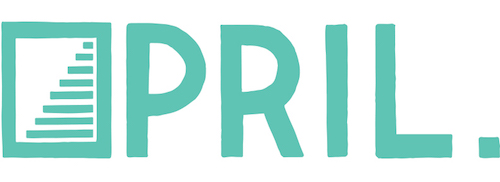
Richard Hugo House

Town Hall Seattle

Martin's picks for GiveBig
GiveBig is here! You've already read Paul's overview on the day, with the list of books-and-literacy themed giving. But we thought personalized picks might help too.
So, here's where I think you can do the most good. My theme? Funding the education of writers you will be reading in the future. Also: watch for Paul's picks, coming at noon.
Clarion West Writers Workshop

There is no more impressive writer bootcamp, inside or outside of "genre" writing, than Clarion West. It is a trial by fire, six weeks long, completely intensive. Eighteen students live in dorms, no matter their age, work together, live together, dream together, fight together. It's a process that turns writers with desire into writers with skill and capability. Writers like current SWFA President Cat Rambo, current Clarion West board member Nisi Shawl, and Nebula winner Rachel Swirsky.
The instructors are the biggest names in the field — Octavia Butler, George R.R. Martin, Ursula K. Le Guin, Harlan Ellison, Neil Gaiman, Roger Zelazny. They come to Clarion West to teach not for the huge paycheck, but because they know they'll be able to make a difference in the life and work of these artists. There's always a boom of great Science Fiction and Fantasy writers doing readings around Seattle during June, thanks to Clarion West.
And when the workshop is not in place, day-long workshops happen throughout the year, for serious students to learn to apply craft.
Clarion West is a scrappy organization, but it's expensive doing what they do, and they always need extra consideration. They're my top pick for where you should send your money this year. Your investment will literally turn into the next wave of speculative fiction stories. You could be helping to fund the education of the next Octavia Butler.
Hedgebrook
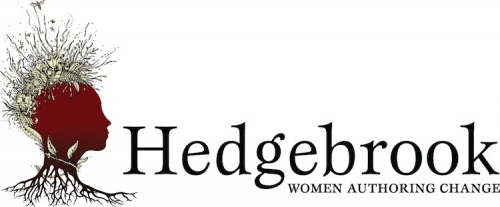
Did you know Gloria Steinem wrote her most recent book in Washington State? Did you know Whidbey Island has one of the most revered writer's retreats in the United States, and that it focuses on women writers solely? The who's who of their alumni list would impress even the most jaded reader, but it's the names you don't know yet who most need the chance of a retreat that can help them transform their writing, with time to focus, and support from staff and alumni. What a treat. Hedgebrook is one-of-a-kind, and a great place to put your donation.
The Greater Seattle Bureau of Fearless Ideas

They're fearless alright. Without front windows thanks to the Phinney gas explosion, with a leaky roof, and with a decidedly big and bold plan for the future. This organization helps kids after school, and they do it in such a big-hearted way. The kids find a second home. We've been lacking our storefront space travel supply store since the explosion — perhaps if we give them more money now, they'll be up and running again sooner, teaching the young writers of tomorrow.
Formulas for Successful Curation
A winner, a swinger, a ringer.
A looker, a loser, an up-on-his-lucker.
Someone looser, someone tighter,
definitely not an all-nighter. A whiner,
wine-swiller, someone to entertain
the fundraiser chicken dinner.
Someone with handlers, another with baggage,
one with the umbrellas, another with the rain.
Different faces, symmetrical and un-.
A smoker, a non-, a joker, a song.
Two lungs, a heart, a head, a leg, a leg.
The drink, the dregs. The beggar, the begged.
Definitely an all-nighter, all-dayer, a swayer
of opinions, a bringer down of hammers.
An issuer of kiboshes, a knitter of knishes,
a whetter of knives, a weather of whether
or nots. A forget-me-not, a violet,
a violin, a cowbell. Someone old,
someone new, someone borrowed,
someone blue. Someone happy,
someone researching happiness,
someone who was happy once.
Someone false. Someone true.
A failure, a failure
who has found success
from failure, a feeler,
a feeling, the flu.
Sugar, salt, and acid.
Lake Crescent, Lake Angry, Lake Placid.
A shouter, a touter, an outer.
An innie, a sharpie, a shark.
What you want. Who you want.
Who wants you. The ditty,
the lark, the dark.
If you can, GiveBIG today
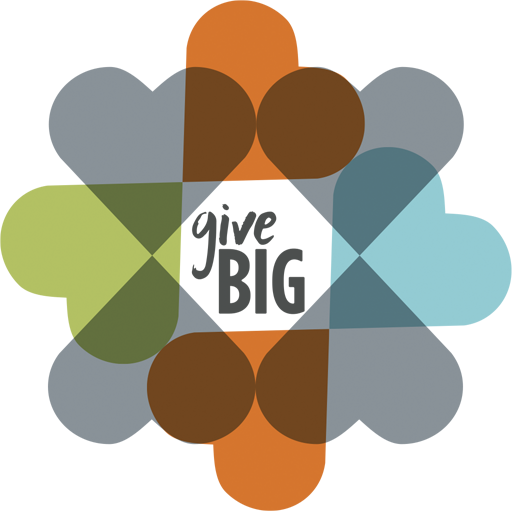
Today is the sixth annual GiveBIG charitable giving event. The deal with GiveBIG is that for one day out of the year, the Seattle Foundation will stretch your donations to nonprofits with funds of their own. In their last five years, they've given more than $56 million to Seattle-area nonprofits.
But how do you sift through the dozens of GiveBIG nonprofits to find the organizations who do the work that you're most passionate about? Allow the Seattle Review of Books to help: below, I've assembled a list of most of the books-and-literacy themed nonprofits on this year's GiveBIG roster. If you'd like to donate to any of these charities, just click on the name and it will take you right to the GiveBIG page. Here they are, in alphabetical order:
- APRIL Festival
- ARCADE Magazine
- Artist Trust
- Arts Corps
- Book-It Repertory Theatre
- Books to Prisoners
- Bureau of Fearless Ideas
- Bushwick Book Club Seattle
- Clarion West Writers Workshop
- Copper Canyon Press
- Fremont Abbey Arts Center
- Geek Girl Con
- Hedgebrook
- Hollow Earth Radio
- Humanities Washington
- Jack Straw Foundation
- Lit Crawl Seattle
- Mineral School
- Old Growth Northwest
- One Reel
- Pongo Publishing
- Richard Hugo House
- Seattle Arts and Lectures
- Seattle Poetics Lab
- Short Run
- Town Hall Seattle
- Zine Archive and Publishing Project
If you'd like a little more guidance, Martin McClellan will be publishing his top three picks for GiveBIG nonprofits at 11 am, and my top three picks will follow at noon. Between now and then, perhaps you should check up on your bank account and figure out how much you can realistically contribute this year. Your money will go a long, long way if you GiveBIG today.
Over at the Seattle Public Library's Shelf Talk blog, Linda J discusses how she failed to keep a New Year's resolution in 2016: "I made just one new year’s reading resolution this year," she writes. "Read no books with the words 'girl' or 'wife' in the title..."
A consciousness with five heads
Sponsor Steve Toutonghi's debut Science Fiction Novel Join was just released, and you owe it to yourself to check out the first chapter on our sponsorship page.
Join is a mind-expanding story set in a world where multiple people can join into a single consciousness. The tale is rich, tense, and nuanced, and full of the mind-expanding ideas only possible in a good science fiction story. We're so grateful to Steve for his sponsorship, and urge you to take a look. The worst thing that can happen is that you discover a new book you want to read. Not such a bad deal, eh?
We have only four sponsor slots left, before August. If you're a small publisher, writer, poet, or foundation that is looking to back our work, and advertise your own in an inexpensive and expressive way, take a look at our open dates. We'd love to talk to you about opportunities to sponsor us. It's our way of making internet advertising something to look forward to.
Seventeen bookstores in a single day: my Independent Bookstore Day journey
#SeaBookstoreDay is our favorite holiday. ❤️💕❤️💕❤️💕📖📖📖 pic.twitter.com/I0NBDcDUIJ
— Courtney (@seattlecourtney) May 1, 2016
I’m not from here. I arrived from New England, in 1993, a grunge-hating, coffee-agnostic seventeen-year-old. Hours in mosh pits covered in other people’s sweat and spit while gazing adoringly at Mark Arm taught me to love the music of this place; becoming a sleepless single mother taught me the joy in the local joe. A great deal of the rest of what I know — about the Pacific Northwest and about life — I learned from independent bookstores and the people who love them.
My first work in Seattle was at University Book Store. Doing undercover security, my job was to spend hours browsing. In the mid-1990s, most of the shoplifters I caught ran a gamut from mellow heroin addicts on the one hand to indignant retirees on the other. In between spending time with those folks, I got to know the store’s merchandise. I learned I loved wonky poetry and moody fiction. My employee discount (15 percent!) enabled me to begin collecting both a personal library and an array of lifelong friends: people like Jeeves and Wooster, Thea Kronborg, Sula Peace, and Jack Wolff. I spent years carrying my copies of the Collected Dorothy Parker and Gertrude Stein’s Tender Buttons wherever I went, just in case I needed them. As I got to know the books, I also got to know the regulars who haunted the back corners reading science fiction or history, and the people who ran the store. One of the booksellers and I fell in love. In fact, I made all my first local friends from among the eclectic and brilliant who peopled and ran the store.
Everything changes. I left the bookstore for writing work; the bookseller and I broke up. But my first years in Seattle — at an independent bookstore, with independent bookstore people — fundamentally altered who I am and what I know. When I heard, last year, that Seattle and some of its neighbors planned to host a celebration for Independent Bookstore Day, I was in. I caught an early ferry and spent the day traipsing to 17 book stores around Puget Sound. I spent too much money and felt perhaps unreasonable (but very local) pleasure from figuring clever ways to dodge traffic. (I can’t share all my secrets, but if you want to make good time, you should hit the busy spots — ferry lines, I-90 — as early in the day as possible.) For my efforts, I acquired the prize: a 25 percent (!) discount at all 17 stores for a year. Over the course of this year, I’ve shyly offered up my Independent Book Store Champion card — a little gold-paper piece of pride I get to keep in my wallet — when purchasing books, notebooks, socks (such great socks at independent bookstores), and chocolate.
This year, I wanted to bring my kid. Eva’s fourteen. For a decade of her life, I was her only parent. Being a two-piece set for so long has, for Eva and I, brought an intense closeness. Eva is from here, but in most other ways we are unusually similar people, from our hair and (meager) height to our extreme bookishness. She’s almost as old as I was when I moved to Seattle; she’s old enough now to have her own sparkly Bookstore Champion card.
One of the things I’ve learned, from books and from bookstore people, is the singular magic of rising early, to prepare in the dark and quiet, for an adventure. When Eva and I woke in the wee hours on Saturday, I made the coffee while she made the snacks. Transplanted and autochthonous, we’re Northwesterners, so we carried the snacks along with the requisite spring-time pile of multi-use clothing layers to the car. We were off.
There was no traffic on I-5. We drove north happy, with the same sleepy anticipation that’s all our adventuring days — camping, trips to Port Townsend to visit poet-sages — so far. As we slowly awakened, we noticed we notice similar things. Before 9 am, each of us drew the other’s attention to: a homeless man at the gas station shouting, “God is good! Look at those beautiful fucking rims!;” a sign on a rural gate that read “DOG BITES. STAY IN CAR;” a ferry line conversation between two stoners that existed only in repetition, “Hey.” “Hey.” “The time has come.” “The time has come.” “At last.” “At last.” All day long, we made a game of watching the waterways we passed and crossed. The Salish Sea, Manzanita Creek, Agate Passage, Appletree Cove. Eagle Harbor, Green Lake, Lake Washington, and Salmon Bay. We wondered: are the water names in other places so prosaic, and so insistently relabeled from indigenous names? Eva, upon hearing (for the first time, apparently) that the Puget Sound is also known as the Salish Sea, said, “Ohhhhh, Mom. So many of your poems make more sense now.” Early on, we lost count of the number of bridges we crossed.
Is Independent Bookstore Day about books, or is it about stories? It was packed at Fantagraphics, where we slunk through a crowd of well-oiled, geeky hipsters and were rewarded with the discovery of a collection of wee, collaborative art books celebrating fabulous women (Nichelle Nichols and Yoko Ono among them). At several shops, we overheard folks questing less to visit all 17 stores and more to acquire the day’s unique merch offerings: “Do you have any more copies of the Gaiman coloring book?” “Nope, we’re out. Try Mockingbird!” At Secret Garden, we were offered the first slices from their massive (and delicious) cake, which we scarfed for second breakfast. Eva got to join my now-annual tradition of buying (excellent) feminist propaganda from Phinney Books, (2015: We Should All be Feminists by Adichie; 2016: X Is For…, the vinyl accompaniment for our copy of Rad American Women A-Z.) And at the Book Larder, our friend Mira knew exactly which Korean cookbooks to run past Eva’s K-pop obsessed eyes. Though I don’t know any of the people personally, I’m pretty sure we were there for the arrival of the former owners of Island Books, who were greeted gleefully by the staff with offers of beer and cookies. Speaking of owners, I got to congratulate John W. Marshall, who will pass his torch of ownership at Open Books soon. Over many years, this man has thoughtfully guided me to some of the best poetry I’ve read, including my first Eavan Boland books. Yesterday, I discovered (and brought home) a book of poems he wrote with his partner, Christine Deavel, called Work Together. I wonder (and look forward to) what work they’ll be up to next.
So, maybe it’s about the people. Last year I got into hock for Independent Bookstore Day; this year I’d saved up. Eva and I brought our list of favorite people and did some early holiday shopping. Finding treasures for friends and family is one of the day’s serendipities. Another is unexpectedly running into the best kind of people — people who love independent bookstores. We bumped into friends we hadn’t seen in ages at Edmonds Bookshop, and a favorite old classmate at Ada’s Technical Books. When the person who went on to visit all 17 stores in record time accidentally left behind his passport of stamps, we got to meet the kind (and adorable) couple who agreed to find him on the ferry to return it to him. I got to see my favorite fellow adventurer, Courtney, with her mom and friends at 8 a.m. in Poulsbo. Courtney and I met last year — same time, same place — when she introduced herself in the sunlit doorway of Liberty Bay.
Seventeen bookstores, 120 miles, two ferries, at least a dozen bridges. Does water separate or connect? Either way, stories are ferries, too. The manager at the University Book Store has an unusual number of stories about me — Pam and I have known each other for a long time. She can tell you about my old bookseller boyfriend, or about how she comforted Eva when she was an infant and screamed every time I left her side. At her current store and my old one, while Eva went looking for Korean textbooks, Pam led me to a display. “Omigod,” she said. “Have you read this? You have to read it.” The Story of My Tits, Pam said, is lyric, spiritual, funny. I had to read it, she said again, and Eva did, too. Obviously, I added the book to my stack.
Elliott Bay Book Company is our current local, and Eva insisted we end our adventure there. We arrived around 3:30, about two hours earlier than last year. The first person I saw when we walked up the wood steps was my favorite bookseller there, the quiet one who has surprised and delighted me more than once with his excellent and thoughtful recommendations. I was so excited to have completed the adventure I interrupted his conversation with another customer to announce our accomplishment. Another bookseller gracefully whooshed Eva and I to the tequila and soda station, where we each got to have a shot of an age-appropriate celebratory beverage.
Everything changes. Next year, Eva will have her driving learner’s permit and we’ll have a new local, at Third Place’s forthcoming Seward Park spot. Perhaps Eva will finally be taller than I am. (Current measure: Eva, 5’1”; Courtney, 5’2.”) Will I trust my kid to drive us through Seattle traffic next year? Will Third Place Books Seward Park offer a congratulatory shot of tequila? Will the adventure be the same? There’s no knowing. After our long and lovely Independent Bookstore Day on the road, I fell asleep on the couch with The Story of My Tits as my pillow and these questions burbling. When I woke up the next morning, the literary tattoo Eva had chosen for me from a stack at Eagle Harbor was just beginning to wear away from my wrist: “So she got up, and held out her hand.” This, in the end, might be what it’s all about.
Queen Anne Book Company is our May Bookstore of the Month
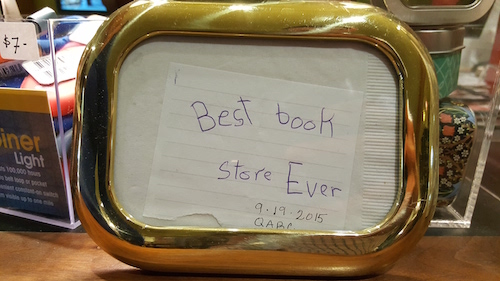
The top of Queen Anne, to me, often feels like an island. The rhythms are different up there than you’ll find down on the streets of Seattle. It’s quieter, a little calmer. Maybe that’s why Queen Anne Book Company, our May Bookstore of the Month, feels a little bit like an island bookstore: it’s small, but it’s incredibly well-stocked for a store of its size. Bookstores on islands have to have a phenomenal collection of books, because they can’t rely on luxuries like next-day shipping or conveniently located book distributors the way mainland bookstores do. They have to have stock for the long haul, and they have to be prepared for the possibility that the mainland might become inaccessible.
Maybe the reason Queen Anne Book Company most resembles an island bookstore, though, has to do with the store’s pedigree: it’s co-owned by Janis Segress, who worked for years at Bainbridge Island’s Queen Anne Book Company. Upon walking into the store you might think to yourself, “their selection looks excellent, but they can’t possibly have [name of book you love].” And then when you go to check, you see that they do, in fact, have the book you were so smug about moments before. It’s a large bookstore somehow folded inside a small-to-mid-size bookstore.
Queen Anne Book Company is the successor to Queen Anne Books, a store that occupied the same space for ten years. Three years ago Segress opened the store with longtime QAB customers Judy and Krijn de Jonge and four former QAB staffers. In the time since, the store has been creating its own traditions.
On Saturday, the store was thronged with customers for Independent Bookstore Day, and employees were rushing around trying to keep up with the rush. Kids entertained themselves in the children’s alcove in the rear of the store as parents collected around the big, beautiful desk that serves as the cash register, information hub, and heart of the building. Segress was welcoming regular customers and people who’d never visited the shop before with a huge smile and eager recommendations.
Every time I’ve visited Queen Anne Book Company, it’s always been this way: you walk in and you know exactly where to go — you gravitate toward the section that appeals most to you — that you need the most — at that moment. Kids instinctively head toward the kids section. The tall bearded man with an unruly gray beard wanders back to the history section. The mother of two beelines to the graphic novel section and checks to see what’s new. Every reader has their place out here on the island.
